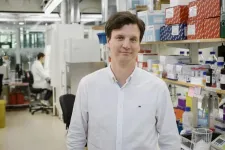(Press-News.org) Peer-reviewed – survey - people
More than a third of people who self-identify as having a smell disorder have had at least one gas safety scare in the last five years, according to new research.
The study, led by the University of East Anglia (UEA) in collaboration with the charity Fifth Sense, asked people who cannot smell well what safety concerns they had and if they had experienced any hazardous events.
A total of 432 people responded to the online survey, which was conducted from February 25 to September 28, 2022, and distributed via the charity.
It revealed that a significant majority of participants (85.9pc) are concerned about safety, particularly regarding gas leaks, smoke, and spoiled food.
The study highlights that over five years, a substantial number of respondents encountered hazardous events related to their condition, emphasising the impact of smell loss on personal safety and emotional wellbeing.
During the previous five years, 32.2pc of respondents had experienced a safety concern related to food, 14.8pc a gas incident in which someone was hurt, 34.5pc a gas scare and 18.5pc a safety incident at work.
Lead researcher Dr Liam Lee said: “This study underscores the critical importance of addressing safety concerns for individuals with olfactory dysfunction.
“The findings show that smell loss significantly affects personal safety and emotional wellbeing. But we can help by finding ways to make things safer for them.
“We could teach people about the risks and make tools like ‘scratch and sniff’ cards1 to help them recognise dangerous smells.”
Before 2020, more than three million people in the UK (5pc of the population) were estimated to be affected by smell loss.
Now around a further one million people are also thought to have persistent problems following a Covid-19 infection.
Some people lose their sense of smell completely (anosmia). Others may experience a reduced sense of smell (hyposmia), unpleasant distorted smells (parosmia) or smell hallucinations (phantosmia).
These changes may be accompanied by loss of or changes to the sense of taste.
A total of 95 people who responded to the survey (22pc) reported a Covid-19 infection as the cause of their olfactory dysfunction.
Co-author Professor Carl Philpott, of UEA’s Norwich Medical School, said: “While most respondents reported not experiencing any adverse events, it's noteworthy that among those without any gas-related incidents, a common reason cited was the deliberate avoidance of living in environments with gas installations due to fear and anxiety of potential accidents.”
Prof Philpott helped to found Fifth Sense with Duncan Boak, who is chief executive of the charity which supports people affected by smell and taste disorders.
Mr Boak said: “This research highlights an important, yet unrecognised, public health issue with serious safety implications.
“Yet there are a lack of treatment options for these sensory impairments and only a handful of specialist smell and taste clinics in England, with none in Scotland, Wales or Northern Ireland.
“Another issue is that we don’t routinely test the sense of smell which means that these problems often get missed with people not getting the care they need, or support and information to help them stay safe at home.
“I hope that our research serves as a prompt for policymakers and the NHS to start working with us to address what is a major health inequality”.
In 2016, Hannah Martin experienced a gas scare that could have had serious consequences. The 32-year-old, who works in financial services and lives in Littlehampton, lost her sense of smell after a viral infection when she was 18.
However, she felt comfortable using all her family’s gas appliances as she had always cooked with her mum from when she was very young.
She said: “This particular evening I was preparing dinner for my mum and I, I ensured the eye-level grill had lit and then turned my back in order to prepare the next part of the meal.
“I’m unsure how much time passed but all of a sudden, my mum came running down the stairs and yelled ‘don’t touch anything that may cause an ignition, I can smell gas all the way on the next floor up’.”
When they checked they found the grill had gone out and Hannah had no idea, even though she had been in the kitchen the entire time.
Hannah said: “I felt horrified when this happened as if I had managed to blow up the kitchen, we have a household of five people on each side of us and there would’ve been no way to warn them at the time. The thought of injuring all those innocent people absolutely terrified me.
“The incident made me lose confidence in myself as from then on I always had to make sure that there was somebody in the kitchen with me if I planned to use any of our gas appliances to prevent it from happening again.”
The scare led to her family finding the Fifth Sense charity, whose safety information they followed diligently, such as ordering detectors to keep Hannah and everyone in the household safe. It helped her to regain her confidence in the kitchen and be able to cook independently again.
She said: “It has majorly impacted my mental health and Fifth Sense’s safety information has literally saved my life. My quality of life would not be what it is without the work that Duncan and his team do. My only regret is that I didn't find them sooner.”
Fifth Sense is working in partnership with Cadent, the UK’s largest gas distribution network, to highlight this issue and ensure that people with a poor, altered or no sense of smell have the information and support they need to stay safe and well at home.
Mark Belmega, Director of Social Purpose and Sustainability at Cadent, said: “It’s really important that we help keep those with anosmia and other smell disorders, safe around gas.
“We know cases have increased following the Covid-19 pandemic and so we’re proud to work in collaboration with Fifth Sense to amplify key gas safety tips, including regularly servicing gas appliances, joining the Priority Services Register and getting gas and CO detectors fitted at home.”
The researchers noted a limitation of the study was that the data was self-reported and there could also be a sampling bias of charity members who are already seeking support.
‘Impact of olfactory disorders on personal safety and well‑being: a cross‑sectional observational study’ is published in the European Archives of Oto-Rhino-Laryngology.
END
Dangers of smell impairment highlighted in new research
2024-03-11
ELSE PRESS RELEASES FROM THIS DATE:
Leonid Sazanov wins Schrödinger Award
2024-03-11
At school, he was inspired by Schrödinger´s book ‘What is Life?’. Now, several decades later, Leonid Sazanov is awarded the Erwin Schrödinger Prize by the Austrian Academy of Sciences (ÖAW). The scientist heads a research group at the Institute of Science and Technology Austria (ISTA) and was honored “for his outstanding achievements in the field of structural biology of membrane protein complexes.” Sazanov is the sixth ISTA scientist to receive the prestigious Schrödinger Award.
“I am especially ...
Does worsening metabolic syndrome increase the risk of developing cancer?
2024-03-11
New research indicates that individuals with persistent and worsening metabolic syndrome—which encompasses conditions such as high blood pressure, elevated blood sugar, excess abdominal fat, and abnormal cholesterol—face an elevated risk of developing various types of cancer. The findings are published by Wiley online in CANCER, a peer-reviewed journal of the American Cancer Society.
In the study, 44,115 adults in China with an average age of 49 years were categorized into 4 different trajectories based on trends from ...
New study reveals transgenerational effects of pesticide linuron on frogs
2024-03-11
Grand-offspring of male frogs exposed to the pesticide linuron exhibited changes in their DNA that was linked to significant physiological impacts, a study from Stockholm University reveals. The research highlights the profound transgenerational consequences of environmental pollution on amphibian populations, which are already under threat of extinction. The study is published in the journal Science of the Total Environment.
Amphibians, particularly frogs, play a crucial role in our ecosystem. However, nearly half of all amphibian species ...
Harvard and ONO Pharmaceutical launch university-wide alliance to address multiple disease areas
2024-03-11
Harvard University and Ono Pharmaceutical Co., Ltd. (ONO) have launched a strategic alliance to advance research across a broad range of therapeutic areas. This collaborative effort marks a significant commitment to identify and develop first-in-class therapeutics for medical conditions in the areas of oncology, immunology, neurology, and specialty.
Through a five-year strategic research alliance spearheaded by Harvard’s Office of Technology Development, the request for proposals will be for research projects focused on the validation of novel therapeutic targets from labs across Harvard University including Harvard Medical ...
Dietitian breaks down the science, sifts through the myths, and offers a different way to think about food
2024-03-11
With so many types of diets being promoted online and on social media, a leading dietitian says flexibility is more sustainable than a rigid diet plan.
Joyce Patterson, MPH, RDN, BC-ADM, CPT is a registered dietitian and a diabetes care and education specialist at Michigan Medicine in Ann Arbor, U.S., and she says the science points to a balanced approach.
“We live in a world full of messages to restrict, eliminate, and fast, and misconceptions related to diet trends are common, such as macronutrient ...
Most survivors of childhood cancer don't get the tests needed to detect serious long-term adverse effects
2024-03-11
Surviving childhood cancer does not always mean a clean bill of health, as the treatments that eradicate those cancers can put adult survivors at risk of new cancers and other serious health problems. Despite the existence of surveillance guidelines that recommend screening for adult cancers and other "late effects" of cancer therapy, childhood cancer survivors (CCS) are rarely up to date for recommended tests, according to a large study published in CMAJ (Canadian Medical Association Journal) https://www.cmaj.ca/lookup/doi/10.1503/cmaj.231358 ...
Financial toxicity affects at least one-third of patients with cancer
2024-03-11
At least one-third of Canadians diagnosed with cancer experience financial distress, called "financial toxicity," which adds to the burden of the diagnosis, write authors in a commentary published in CMAJ (Canadian Medical Association Journal) https://www.cmaj.ca/lookup/doi/10.1503/cmaj.230677.
"Financial toxicity, which refers to the direct, indirect, and emotional costs to patients following a cancer diagnosis, is increasingly recognized as a risk factor for poor health and cancer outcomes," writes Dr. Rachel Murphy, University of British Columbia and BC Cancer Research Institute, Vancouver, ...
Going top shelf with AI to better track hockey data
2024-03-11
Researchers from the University of Waterloo got a valuable assist from artificial intelligence (AI) tools to help capture and analyze data from professional hockey games faster and more accurately than ever before, with big implications for the business of sports.
The growing field of hockey analytics currently relies on the manual analysis of video footage from games. Professional hockey teams across the sport, notably in the National Hockey League (NHL), make important decisions regarding players’ careers based on that information.
“The goal of ...
For people who speak many languages, there’s something special about their native tongue
2024-03-11
CAMBRIDGE, MA -- A new study of people who speak many languages has found that there is something special about how the brain processes their native language.
In the brains of these polyglots — people who speak five or more languages — the same language regions light up when they listen to any of the languages that they speak. In general, this network responds more strongly to languages in which the speaker is more proficient, with one notable exception: the speaker’s native language. When listening ...
Blood-based marker developed to identify sleep deprivation
2024-03-09
A blood test that can accurately detect when someone has not slept for 24 hours has been developed by experts at Monash University, in Australia, and the University of Birmingham, in the UK.
This level of sleep deprivation increases the risk of serious injury or fatality in safety critical situations.
Published in Science Advances, the biomarker used a combination of markers found in the blood of healthy volunteers. Together, these markers accurately predicted when the study volunteers had been awake for more than 24 hours under controlled laboratory conditions.
The ...


